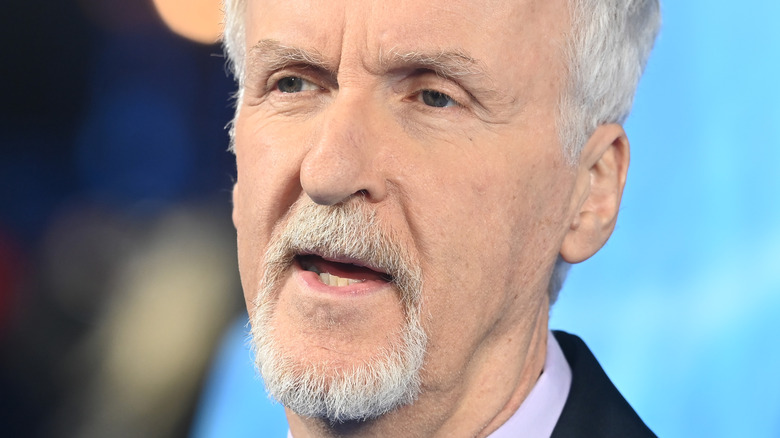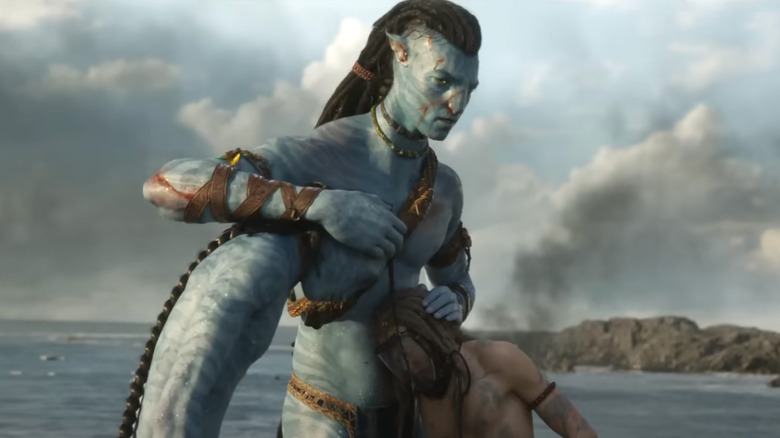Avatar Director James Cameron Weighs In On The Debate About CGI Actors
James Cameron has rarely not been the director at the forefront of cutting-edge CGI technology in his career. The realistic humanoid CGI utilized to create the T-1000 in 1991's "Terminator 2: Judgment Day" is described today as a milestone for visual effects (per Industrial Light & Magic). Cameron went on from there to figure out how to sink the Titanic in 1997 to the tune of it becoming the top-grossing movie of all time. That crown was later taken by 2009's "Avatar," where Cameron took visual effects to a new level again, using 3D technology and motion capture effects to create large stretches of the film where there's not a human being in sight (via Box Office Mojo).
Cameron followed up "Avatar" with the 2022 sequel "Avatar: The Way of Water," which includes a more expansive look at the world of Pandora. The "Avatar" movies stand as solid proof that CGI technology has advanced to the point where fully-realized and emotive creatures can potentially be entirely created with code. The question for many is what the next chapter for CGI is. The logical next step would arguably be fully-realized CGI characters, sans actors, being used.
If there's one director whose opinion on CGI vs. actors carries any weight, it's Cameron. The filmmaker weighed in on the idea of using nothing but CGI to piece together performances, leaving the actors — and their paychecks — out of the process.
James Cameron prefers working with actors
In an appearance on the "SmartLess" podcast promoting "Avatar: The Way of Water," James Cameron was asked his opinion about films utilizing computer-generated people in favor of actors. According to Cameron, the "Avatar" movies may have scenes covered in special effects from head to toe, but the goal is merely to enhance what the actors are bringing to the story.
"In a sense, it's more like makeup. It's 100 percent actor-driven, and we always honor the performance and the nuance in that performance, as you'll see in the new film," the director said (per "SmartLess" podcast). The filmmaker did go on to say that though the technology is not there yet, applying artificial intelligence technology to what he's done in the "Avatar" movies could realistically offer up convincing computer-generated performances.
"I would say if you converged the toolset that we have created for 'Avatar,' and focused it, literally, and put money into that and focused it in terms of getting real-time process and you added A.I. to that, you could fake anything," he said. The director added that realistic computer-generated people or performances would benefit a virtual reality gaming environment more than film. Despite his love of CGI, Cameron just wants to keep working with actors.
"It's still so much easier and, by the way, more fun to just work with actors," he said.
Avatar was developed since before Titanic because performance capture was so important to James Cameron
James Cameron may deploy CGI on the regular, but the man also knows how to capture a performance. It's the importance of the non-CGI aspects of his films that actually kept him from making "Avatar" for so long. Though the movie landed on screens in 2009, it had actually been developed before the release of "Titanic." Cameron went far enough that he worked out an initial budget for the epic tale, but the fact that he couldn't fully capture his actors' performances put "Avatar" on standby.
"We did initial budgets and started to go into the digital feasibility in 1996 before we started 'Titanic.' Then 'Titanic' sort of took over my life for a couple of years. I didn't really return to the project until I saw that there was significant advancements in facial performance in character and animation," Cameron said in 2019 to Variety.
Cameron's sentiment remains the same years later. While promoting "Avatar: The Way of Water," Cameron acknowledged that character and story bring audiences to theaters, not technology. "I'm bored with the technology! You can't imagine anybody sitting at home and saying, 'Honey, let's go to the movies, they got some new technology!'" the director said (via South China Morning Post).


